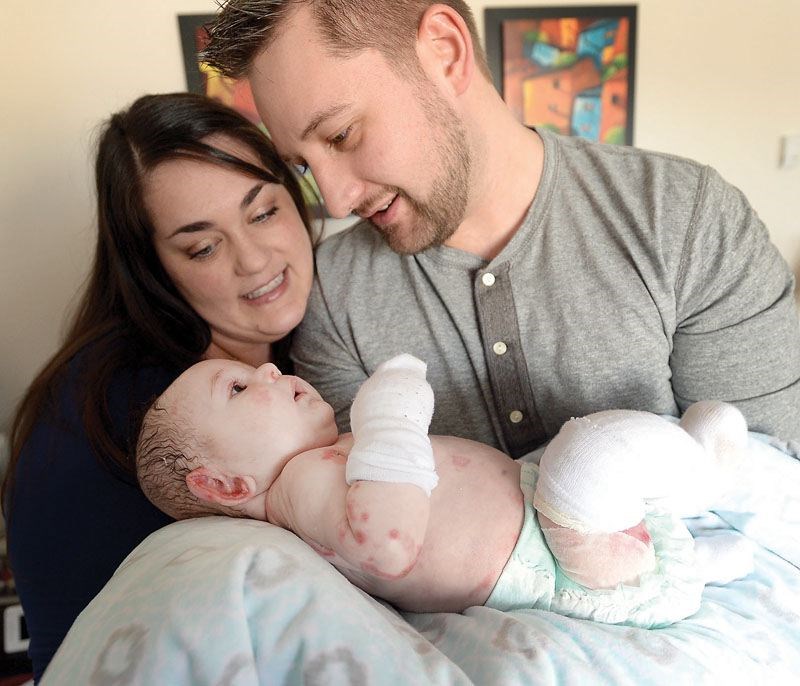Every new parent is used to the routine of late-night feedings and diaper changes, but for Bryn and Christy Fell the traditional tasks have taken on added complexity.
Their infant son Shea has been diagnosed with epidermolysis bullosa, a rare genetic condition that makes his skin blister with even the slightest amount of friction. The painful ailment means Shea is unable to feed from a bottle, he needs specially designed diapers and has dressings that must be changed three times a week.
To feed Shea, his parents need to squirt milk into his mouth - often a frustrating and time consuming process. His diapers are designed to reduce friction, but that also leads to problems with leakage and his special dressings means cleaning up isn't as simple as putting him into a bathtub. He also requires special clothing and extra-soft blankets to protect his skin, not to mention pain medication to make him feel comfortable.
Yet through it all - the pain of the skin condition, the challenges with feeding, the lengthy stay at the hospital in the Lower Mainland - Shea still has a smile on his face.
"He's an amazing little guy, he's such a trooper and he's for the most part content and happy," Bryn said. "Since we have gotten home he's much more generous with his smiles and he's started to goo and pick up with all that normal baby stuff, which is so amazing to see, but he really does take an awful of work, even by normal baby standards."
After spending months in hospital in Vancouver and at Canuck Place, the family returned home to Prince George earlier this month and is beginning to settle into a routine. They currently get 36 hours of at-home nursing care a week, enough to help with the four-hour process of changing dressings three days a week, as well as some respite time.
Bryn said they feel honoured that doctors have the confidence in them to ensure Shea is getting the care he needs, but admits it can be a bit intimidating at times. For instance, when Shea spat up right after receiving his pain medication, Shea and Christy didn't know what to do.
"We had to call down to Canuck Place and ask them what their recommendation was," he said. "Obviously we don't want to overload him but at the same time we need him to be comfortable."
Having the specialists a phone call away is great, but so his having the privacy of their own home again after months away.
"We're doing fairly well, as best as can be expected," Bryn said. "There's certainly tears daily but we have been amazed at how much relief there is in being home and the fact we can sleep in our own bed."
There is no known cure for epidermolysis bullosa and it will end up being terminal, so Shea and his parents will need to continue with the specialized bandaging and pain management program indefinitely. While that might seem daunting, Bryn said the fact that their three-month-old baby is able to adapt to his reality is inspiring.
"Part of our saving grace is that he's such a happy baby," he said. "He takes it day-by-day just like the rest of us. He doesn't complain a whole lot, except when he's hungry or has a dirty diaper. He's a pretty awesome little guy."
Bryn said since Shea's condition was first reported in the local media in January, there has been an outpouring of support from the community. Money was raised to help defer their costs while Shea was in the hospital and strangers called to offer assistance.
"We've been amazed at the response and support we've received from the community already," he said. "This whole process has really shown us how amazing it is to live in a small community where people look out for their neighbours and take the time to check in."
The family has been updating friends and family on their blog at loveforshea.com. The website also has a link for people to make a financial donation and a contact form for people who want to help in other ways.
At the moment Bryn said one small way people can be of assistance is by providing meals for the family. Because looking after Shea requires so much work, often Bryn and Christy aren't able to get around to making dinner until late in the evening.
"That's been a little bit difficult to stay on top of, especially on dressing change days," he said.


